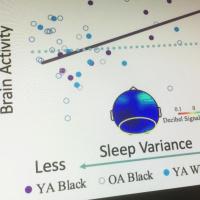News

On the heels of the 2019 Ig Nobel Prize in Physics, two more awards have been bestowed on David Hu. The American Institute of Physics (AIP) selected…

When the National Science Foundation and the Simons Foundation launched the Research Centers for Mathematics of Complex Biological Systems (MathBioSys) initiative two years ago, the idea was to bring two distinct disciplines together to enable…

NIH supporting Petit Institute/School of Biological Sciences researcher’s research strategy

Corals exude chemical defenses against bacteria, but when heated in the lab, those defenses lost much potency against a pathogen involved in coral bleaching. There's hope: A key coral's defense was heartier when that coral was taken from an…

The American Physical Society (APS) has elected Flavio Fenton and Carlos Silva to the Society's 2019 Fellows. …

School of Earth and Atmospheric Sciences Assistant Professor Chris Reinhard studies the early Earth in the hopes of learning clues about potential Earths outside our solar system.

Mythbuster: The idea that bacterial collaborations within microbiomes, like in the mouth, have evolved to be generous and exclusive very much appears to be wrong. In an extensive experiment, lavish collaborations ensued between random…

How wombats produce the distinctively shaped poop has been of interest to the research teams of Georgia Tech mechanical engineering professor David Hu and…

The National Institutes of Health has awarded a $2.5 M grant over five years to advance the clinical potential of bacteria-killing viruses to treat antibiotic-resistant infections. Joshua Weitz of the School of Biological Sciences and Justin…

To walk or run with finesse, roaches and robots coordinate leg movements via signals sent through centralized systems -- but utterly divergent ones. Despite their seemingly unbridgeable differences, researchers have devised handy…

It nearly baffled researchers to see amino acids that make up life today spontaneously link up under lab conditions that mimicked those of pre-life Earth. The amino acids formed short predecessors of today's proteins even though …

In a future where self-driving and other internet-connected cars share the roads with the rest of us, hackers could not only wreck the occasional vehicle but possibly compound attacks to gridlock whole cities by stalling out a limited…

Evidence exists for oxygen-releasing photosynthesis evolving as early as 3 billion years ago. However, the oxygen-rich atmosphere we take for granted today has existed for only about 10% of Earth’s 4.5-billion-year history. Why did oxygenation of…

A new study has found that variability in night-to-night sleep time and reduced sleep quality adversely affect the ability of older adults to recall information about past events. The study also found unexpected racial differences in the type of…

Some animals that can’t manufacture their own chemical weapons feed on toxic organisms and steal their chemical defenses, having evolved resistance to them. One animal that does this is a sea slug that lives on the reefs surrounding Hawaii and…

Scientists may need to rethink their estimates for how many planets outside our solar system could host a rich diversity of life in light of the discovery that a buildup of toxic gases in the atmospheres of most planets makes them unfit for…

Those same antibiotics driving antibiotic resistance could also help defeat it if used with the right strategy. Making it work would require companion health strategies like staying home from work when…

Ever since she could remember, Elma Kajtaz has been fascinated by the nervous system, its mechanics, and how these mechanics help determine an organism’s behavior.

Georgia Tech has named William Ratcliff and Peter Yunker as recipients of the 2019 Sigma Xi Faculty Best Paper Award.…
